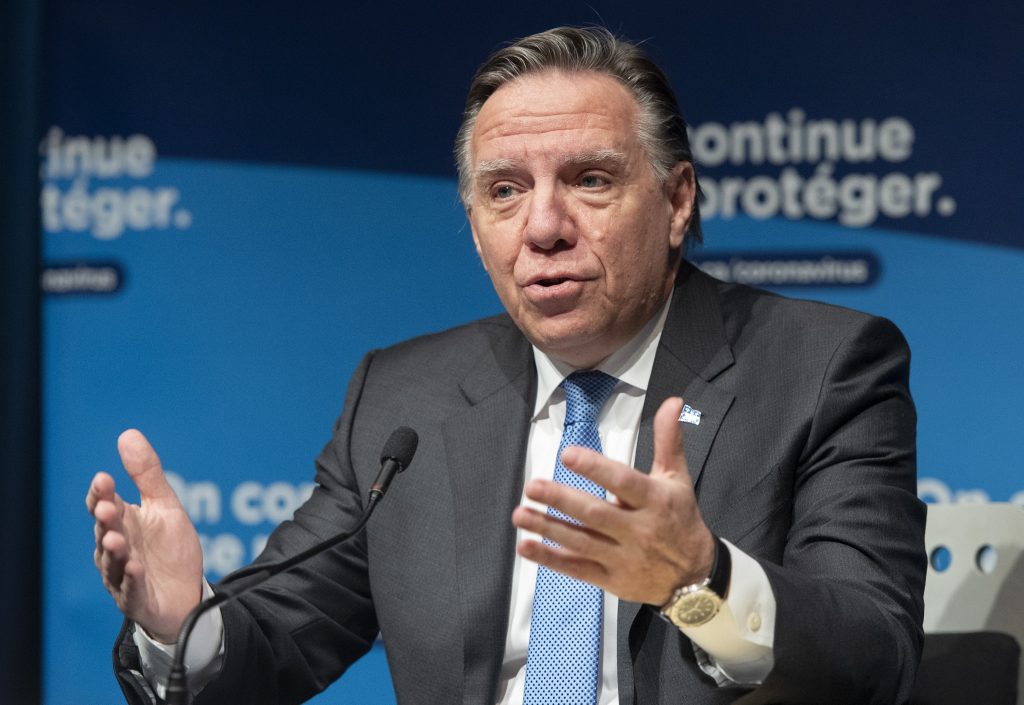Canada News
Quebec imposes nighttime COVID-19 curfew starting on New Year’s Eve

MONTREAL — Warning that hospitals could soon be overwhelmed with COVID-19 patients, Quebec Premier François Legault imposed a series of new restrictions Thursday, including a nighttime curfew that will begin on New Year’s Eve.
The curfew will run from 10 p.m. to 5 a.m. for an indefinite period of time, Legault told reporters in Montreal.
“In the coming weeks, there is a risk that the number of hospitalizations will exceed our capacity,” Legault said, adding that COVID-19-related hospitalizations, which stood at 939 on Thursday, had doubled in one week.
Health officials reported a record 14,188 cases on Thursday, and Legault said the province will report more than 16,000 new cases on Friday.
“It’s an extreme action to take,” Legault said, “because the situation is extreme.” He said that when the rate of transmission in the province is under control, the curfew would be the first health order the government would remove.
Also beginning Friday, restaurants must close their dining rooms and serve takeout only, and indoor private gatherings will be banned, Legault said. Gyms, bars and other entertainment venues have been closed since last week.
Legault also announced that schools, junior colleges and universities won’t reopen to in-person classes until at least Jan. 17. Places of worship will have to close on Friday except to hold funerals, which will be limited to 25 people.
“We have to act rapidly — the situation is evolving rapidly,” Legault said. “As deciders, we have the responsibility to act; we can wait for all sorts of studies and more details, but it’s better to act and adjust a little later.”
The province first imposed a curfew during the pandemic on Jan. 9, 2021, and only lifted the health order on May 28. Quebec is the only province in Canada to have imposed a curfew during the pandemic.
Earlier Thursday, the research institute that reports to the government, Institut national d’excellence en santé et en services sociaux, said its modelling predicted “significant growth in new hospitalizations and the consequent occupancy of regular and intensive care beds over the next three weeks.”
It said its models indicated there could be between 1,600 and 2,100 COVID-19 patients outside intensive care over the next three weeks. The institute said the number of intensive care patients during that period could be between 300 and 375. The more pessimistic scenarios — 2,100 regular COVID-19 patients and 375 intensive care patients — would surpass anything recorded during the previous waves of the pandemic.
Health Minister Christian Dubé told reporters it was unclear how many patients were in hospital to be treated for COVID-19 disease and how many had entered hospital for unrelated reasons and had tested positive. He said the government has estimated the number to be as high as 25 per cent.
“We are trying to extract these cases,” he said, referring to the official total of 939 COVID-19-related hospitalizations that health officials released earlier in the day.
Health experts differ on whether a curfew is needed to slow the spread of the novel coronavirus in the province.
“The problem with the curfew is that there are studies that suggest it doesn’t work, that it doesn’t have an impact on controlling transmission,” Benoit Barbeau, a biology professor at Université du Québec à Montréal who specializes in virology, said in an interview.
“The best measures are the ones that directly prevent people from interacting with each other, such as in restaurants, stores, shopping malls. Those are all places where we could reduce transmission.”
But Dr. Christopher Labos, a Montreal-based cardiologist with a master’s degree in epidemiology, said he thinks a curfew is necessary, given that Quebec is now at a point where it is asking health-care workers who have tested positive for COVID-19 to return to work before the standard 10-day isolation period.
“It’s not a question of what we want — nobody wants a curfew — but the question is do we need it? And when you’re having over 10,000 cases per day, hospitalizations going up and the health-care system basically acknowledging that there’s a serious staff shortage that could impact patient care, we clearly have to take significant actions to get the situation under control,” he said in an interview.
Labos said it’s difficult to assess the effectiveness of a curfew because it has only been used during the pandemic in conjunction with other measures.
This report by The Canadian Press was first published on Dec. 30, 2021.
—
This story was produced with the financial assistance of the Facebook and Canadian Press News Fellowship.
Jacob Serebrin and Virginie Ann, The Canadian Press





















